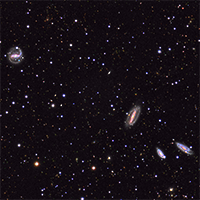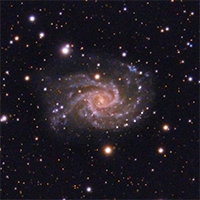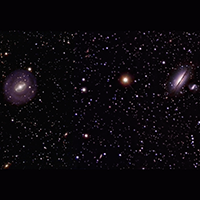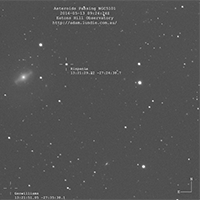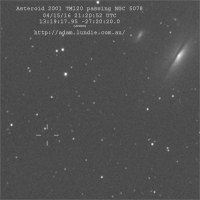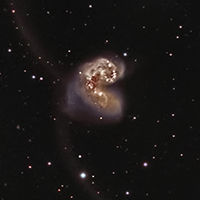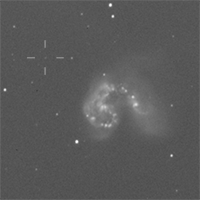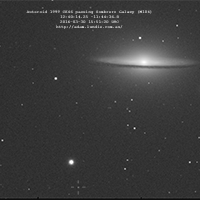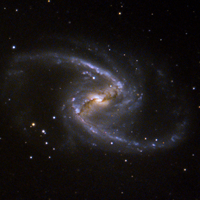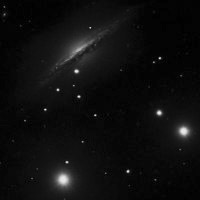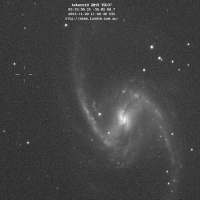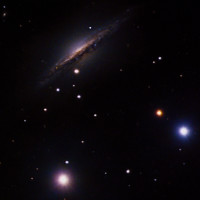Tagged: galaxy
20-Aug-2017
The Grus-Quartet consists of four large spiral galaxies, between 63 and 99 million light years away, which are so close to each other that they are interacting.
21-Apr-2017
NGC2835 is a small, faint spiral galaxy in the Hydra constellation. It was probably too small and faint to attempt from the suburbs of Brisbane, but I persisted through the very few clear nights I could get over the last 6 weeks.
31-May-2016
This two panel mosaic shows the large galaxies NGC5101 (left) and NGC5078 (right), approximately 89 and 94 million light years distant. Galaxy IC879 is interacting with NGC5078, while galaxy IC4222 is shown in the bottom right corner. Numerous other small galaxies appear throughout the background
31-May-2016
This two panel mosaic shows the large galaxies NGC5101 (left) and NGC5078 (right), approximately 89 and 94 million light years distant. Galaxy IC879 is interacting with NGC5078, while galaxy IC4222 is shown in the bottom right corner. Numerous other small galaxies appear throughout the background
19-May-2016
Hispania (1915 WT) is the brightest asteroid I've ever seen. It's so bright, I had to remove it from each frame for plate solving to work. Also moving through the frame is another named asteroid: Geowilliams (1984 UL2)
19-Apr-2016
While looking through the data captured of NGC 5078, I discovered a very dim object slowly moving through the field of view. I have identified the object as main belt asteroid 2001 TM120, magnitude 15.5.
06-Apr-2016
The Antennae Galaxies, also known as NGC 4038/NGC 4039, are a pair of interacting galaxies ~45 million light years away. They are currently going through a starburst phase, in which the collision of clouds of gas and dust, with entangled magnetic fields, causes rapid star formation.
06-Apr-2016
The Antennae Galaxies, also known as NGC 4038/NGC 4039, are a pair of interacting galaxies ~45 million light years away. They are currently going through a starburst phase, in which the collision of clouds of gas and dust, with entangled magnetic fields, causes rapid star formation.
05-Apr-2016
While looking through the data captured of the Antennae galaxies, I discovered a very dim object slowly moving through the field of view. I have identified the object as main belt asteroid 2000 JU23, magnitude 18.8
31-Mar-2016
While looking through the data captured of the Sombrero Galaxy, I discovered an object slowly moving through the field of view. I have identified the object as main belt asteroid 1999 CK46, magnitude 17.4.
27-Nov-2015
NGC 1365 is a barred spiral galaxy 56 million light years away. Presented here is a hydrogen alpha enhanced color photograph.
25-Nov-2015
Often I like to see how an image is processed from start to finished. Presented in this animation are the main processing steps in sequence from my image of NGC 1055
23-Nov-2015
While looking through the data captured of NGC 1365, I discovered an object slowly moving through the field of view. I have identified the object as asteroid 2015 TG237, discovered just last month.
23-Nov-2015
While looking through the data captured of NGC 1365, I discovered an object slowly moving through the field of view. I have identified the object as asteroid 2015 TG237, discovered just last month.
20-Nov-2015
NGC 1055 is an edge-on spiral galaxy located 52 million light-years away.
